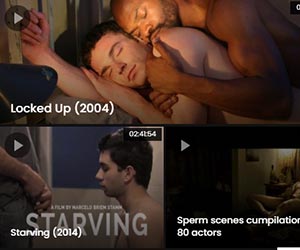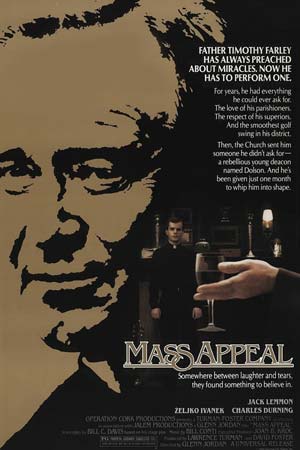A popular Connecticut priest shields a seminary rebel from the wrath of a stern monsignor.
Wikipedia – https://en.wikipedia.org/wiki/Mass_Appeal_(film)
For years, as pastor of an affluent, suburban Catholic parish, Father Tim Farley has maintained a close relationship with his congregation by delivering folksy homilies filled with practical advice and adhering to clerical policies without waver. One Sunday, his sermon is interrupted by seminarian Mark Dolson, who questions Farley’s position on the ordination of women. The older priest charmingly sidesteps the young man but is annoyed that he was placed in an uncomfortable position. This is a man who relies on charm, harmless white lies, and inane jokes when interacting with his parishioners, and he always has been careful not to get involved in controversial issues.
Dolson defends two seminarians who were expelled after being suspected of engaging in a homosexual relationship. After he is ordained a deacon, frustrated Monsignor Thomas Burke assigns him to Farley’s parish in the hope the older man will inspire him to toe the line and become more complacent. Although in some ways conservative—he criticizes his sister Liz for her affair with a married man—the young man primarily is a liberal firebrand who is anxious to make changes in the church, whereas Farley prefers study with a bottle of alcohol and not make waves.
The pastor tries to become a mentor to his new charge, but Dolson ignores the priest’s efforts to teach him the necessity of tact. He enrages the congregation with his first, highly critical sermon.
Questions as to why Dolson defended the gay seminarians arise. He confides having spent two years engaging in sexual relations with both men and women, saying he now is committed to celibacy. Farley urges him to keep quiet about his past, but the deacon admits his secret to the monsignor and is expelled.
Farley promises to convince his followers that the church needs liberal thinkers who don’t always do things by the book. As soon as he senses he is losing
support, however, the priest backs down. Dolson angrily confronts him with a feeling of betrayal, forcing Farley to rethink his position and do the right thing, even if it means the loss of his parish.
Imdb user
My favorite actor, or perhaps I should say that the actor for whom I have the most respect, is Cary Grant. And the reason is, that perhaps more than any other one actor, Cary Grant could shift from drama to comedy without any problem at all, and do both brilliantly. Although Jack Lemmon doesn’t quite reach the peaks that Cary Grant did, it’s close. I can think of comedies where Lemmon is brilliant. I can think of dramas where Lemmon is brilliant. But the problem with being particularly talented with comedy is that some people then mistake a film as being a comedy. That is true for this film. Is there humor in this film? Yes, a fair amount. But the story is one of tragedy. Instead of being deacons, young men are being kicked out of the seminary. And, one of the deacons who stands up for them, is also being kicked out of the seminary. Guilt by association. Guilt due to honesty. Meanwhile, a well-established popular priest (Lemmon) has sympathy for the deacon who will be removed because he spoke up, and Lemmon decides to help him…only to discover he doesn’t have the strength within to do so because it threatens his own standing in his own church. So, this is a comedy? I don’t think so.
Although I remember going to this film in 1984, apparently it did not do very well at the box office. Perhaps a large part of that is that the audience — it would mostly interest Catholics — was limiting. And that’s a shame, because I’ve always felt this was one of Jack Lemmon’s better performances. I would go so far as to describe it as “masterful”, and to me, his last truly great dramatic role.
The young deacon — Zeljko Ivanek — is very impressive in this film. I always wondered what happened to him, but I see that he actually has been quite busy on television and Broadway…just not in things that I have watched. It takes a while in this film to see just how good he was, but once you get beyond the character’s brashness, you see the sensitivity of the actor.
The other major role here is Charles Durning, who I first took real note of in “Queen Of The Stardust Ballroom”, a teleplay. I have long felt him to be one of the finest character actors in recent screen history. Here he plays the “bad guy” — the head of the seminary who is dismissing students. So you’re not apt to be very sympathetic to his character, but he plays the role very well.
I should mention Louise Latham, who has a role here as the housekeeper at the rectory. It’s not a major role, but I always enjoyed seeing this character actress on the big screen or on television.
I highly recommend this film for both the story and for the acting. And, it’s on my DVD shelf.





















